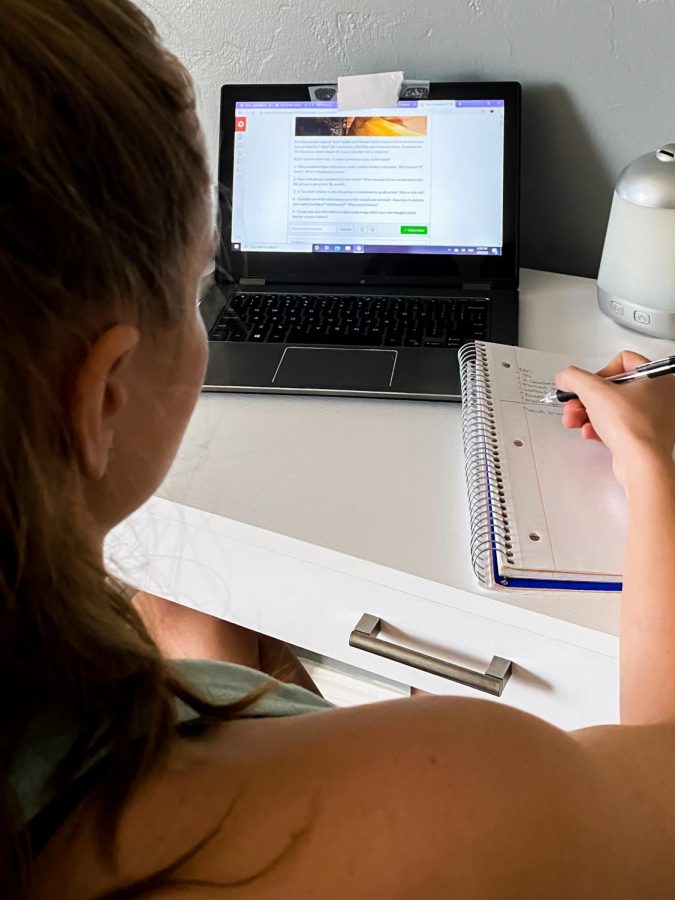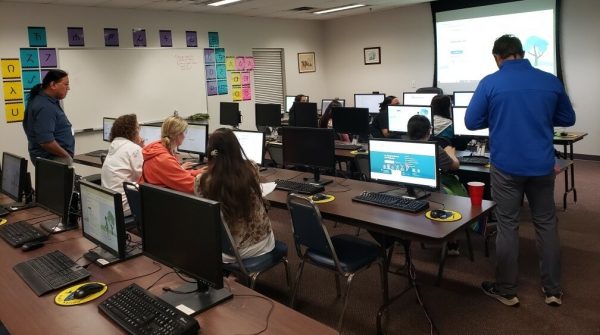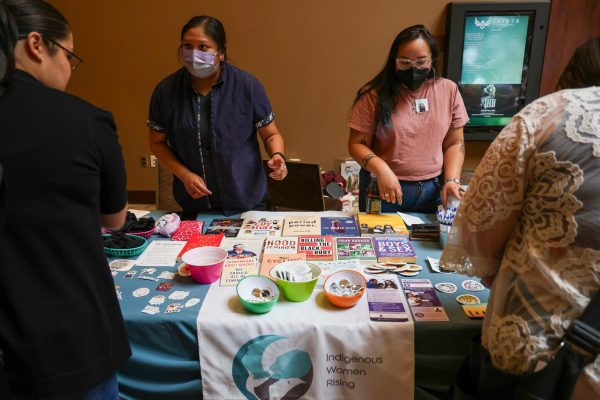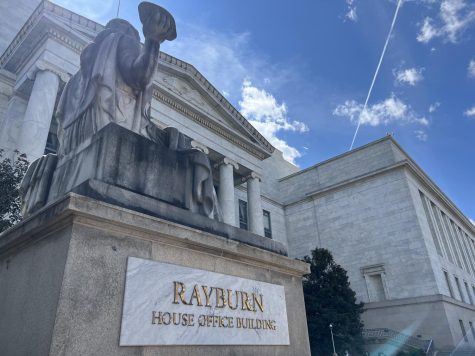Online classes lead to claims of privacy invasions
With Covid-19 abruptly forcing the remainder of the spring college semester to virtual learning through technologies such as Zoom or Skype, some faculty have struggled to make the transition smooth.
College students say they didn’t sign up for online classes, which limits a student’s opportunities to meet with faculty or mentors.
On at least one Oklahoma campus, the switch has led to privacy invasion claims.
Daysha Black, a second-year nursing student at Rose State College in Midwest City, said a Health and Science professor who teaches introduction to clinical microbiology required her class to download software with a monitoring feature that could be used to record the students as they took the exam by using the computer’s camera and microphone.
Respondus LockDown is a browser extension that, once downloaded, locks the user’s computer and prevents the opening of other browsers. The goal is to decrease the risk of cheating on at-home exams.
“I’m not using my own laptop so I didn’t feel comfortable having to download the app even though she made us,” Black said. “ We didn’t want Respondus on our laptops because we read reviews on them and they’re not very good. Some people have been hacked, it’s messed up their computers.”
Gaylord News reached out to the professor multiple times but was unable to contact her.
Respondus Inc. says its software can be used on personal devices, but that is not its main objective.
“When used by itself (without the Respondus Monitor proctoring system), LockDown Browser is intended for proctored settings, such as a classroom or testing center,” Respondus Inc. officials said in an email.
However, the professor required students to use Respondus Lockdown in an at-home setting.
Barbara Baumeister, dean of the Rose State Health and Science Division, said Respondus Monitor is used worldwide.
“The service prevents the student from accessing websites other than the online assessment and records students as they complete an assessment,” Baumeister said in an email. “It then provides the recording to professors and highlights those recordings that involve suspicious student behaviors.”
“This service is one of the most popular strategies utilized to ensure student identity and academic honesty,” Baumeister said.
Black said she and her fellow students were not told the software included a feature that could record them as they took the exam.
On April 9, Baumeister told Gaylord News that Respondus Monitor does record students while taking an exam. Later that day, Baumeister said she spoke with Travis Hurst, dean of eLearning and academic outreach, who said the Respondus LockDown application does not record video of the students.
Baumeister also said Hurst told her he has not experienced problems with Respondus being vulnerable to hackers even though it requires installation on students’ personal devices.
However, Chuck Louviere, a Rose State instructional technologist who works with the college’s online Canvas system and directly with faculty, suggested it is possible for students to be hacked through Respondus LockDown.
“It’s hard to say that something is not possible because hackers are pretty good at what they do,” Louviere said. “When you are talking about somebody using their own personal device, not an official campus- issued or campus-monitored or campus- managed, you know something that IT would be responsible for, it’s hard to say what’s going on, on somebody’s personal computer.”
Louviere appeared surprised, however, when told the University of Oklahoma discourages the use of applications such as Respondus.
In an email sent to faculty, dated April 6, the OU’s internet technology department said such tools are “limited in nature with respect to accessibility and lack of compatibility across devices, this tool is considered highly inequitable and strongly discouraged during periods of remote instruction where students may not have access to approved devices.”
One of Black’s classmates, who asked that her name not be used, said her computer has not worked properly since she downloaded Respondus LockDown.
“The first time I downloaded it my laptop kept crashing in the middle of me doing stuff,” the student said. “The screen would just go black and I’d have to restart it.”
Tara Hall, professor of sociology at Rose State College, said she is choosing not to use proctoring software for her online classes.
“I have made a decision not to because many of my students that had their classes transitioned are already going through so many changes and challenges,” Hall said in an email. “Many of them are stressed about the new format and I did not want to add to that stress.”
Erick Worrell, Oklahoma City Community College’s interim executive director of marketing and public relations, said OCCC is exploring Browser LockDown features but not currently recommending their use.
“The last thing we want to do during this strange time is take the human element out of the classroom (even a virtual one), so we’re relying on monitoring through Zoom and other tools to help maintain accountability among students and faculty,” Worrell said.
Black said that after she reached out to the professor about her concerns regarding Respondus, the professor told her she was the only student to do so. But Black said she spoke with several other students who had concerns.
Black said she emailed Baumeister in an effort to understand and solve the issue, but was disappointed in Baumeister’s efforts. She said she feels like faculty members are not listening to the students.
“When it comes to the Health and Science Division I feel like the dean and the teachers are all on the same page and they are refusing to hear what the students have to say,” Black said.
Black said she also feels some of the students are not being treated fairly.
“If we weren’t to take the test with the Respondus, she wanted us to have to come up there in person to a testing center, but our school doesn’t want any students up there.”
Rose State academic testing center is currently closed due to Covid19 social distancing, though professors do have the option to schedule emergency testing. However, because Black had been recently traveling, she likely would not have been allowed into the testing center at all.
However, to avoid failing the exam, Black downloaded Respondus Lockdown, but is hoping she will not have to download the software for future exams.
Lauren Johnson, a University of Oklahoma student, said she is also disappointed in the transition from physical classes to online.
“I didn’t sign up for a semester of online classes,” Johnson said. “I signed up for physical classes where I can really progress new skills. Now, I don’t have that. I’m adapting and still learning but it definitely isn’t the same.”
Baumeister said colleges are all having to adapt due to the challenges of Covid19.
“With the recent crisis created by COVID-19, academic institutions are being required to alter their usual assessment routines,” Baumeister said. “These are challenges we are unexpectedly facing as a result of recent events.”
An article in the Northern Illinois University, Faculty Development and Instructional Design Center, by Dan Cabrera lists several ways to reduce cheating in an online environment. Cabrera says using subjective questions is one method.
“This type of question is more subjective in nature and may demand a deeper understanding of the subject being tested,” Cabrera said.
Assigning a time limit to an online exam can also inhibit students from cheating.
Black said she would like the Health and Science Division at Rose State work with other college divisions to come up with a solution that does not invade student privacy and ensures professors disclose details of new technologies they want students to use.
That is what Hall said she is doing by relying on other methods to reduce the risk of cheating online.
“Now, I utilize other techniques to try and curb cheating and accept that I can only prevent so much,” she said.
Gaylord News is a reporting project of the University of Oklahoma Gaylord College of Journalism and Mass Communication.

















